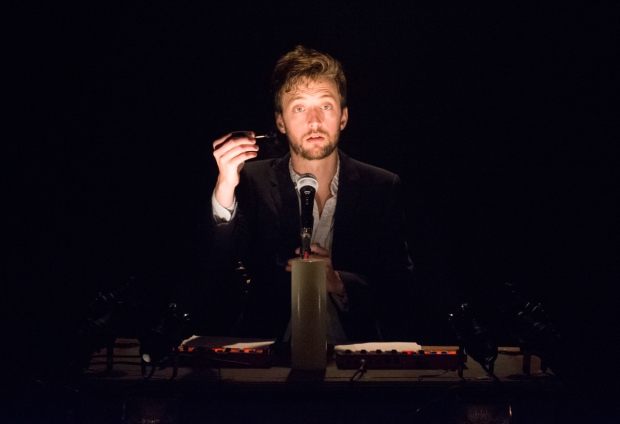Edinburgh review: Heads Up (Summerhall)
Kieran Hurley’s play ”Heads Up” is a look at the world on the brink of catastrophe

(© Niall Walker)
"This is a story about a city like this one, here and now," purrs Kieran Hurley from behind a wooden desk. "It’s a story about the end of the world."
His title, Heads Up, is both warning and instruction. For while their world – our world – teeters on the brink of catastrophe, all Hurley’s citizens are staring down at their screens. The two things aren’t unconnected – even if the people are.
Futures trader Mercy scans the markets for signs, just as people once looked to the stars – and today’s signs aren’t good. In fact, they’re catastrophic; far worse than a mere crash. Across town, 13 year-old Ash is acing Sim City, replacing roads with railways to sidestep pollution, and fending off her boyfriend’s advances. Pop star Leon’s snorting coke and watching his last gig back, basking in his own glory. Abdullah’s reading his emails: one, a mass mail from his boss, demands employees display "people-perfect behaviour."
Hurley’s split-screen storytelling drives home the infuriating irony of our atomised networked society. Each story has its own soundtrack, all pulsing electric beats by Michael John McCarthy, and each is entirely self-contained; characters caught up in themselves. Leon seeks charitable vanity causes as his partner goes into labour; Ash hides in the schools loos, away from the nude selfie that’s doing the rounds. "Too much empathy’s a killer," thinks Abdullah, having learned social networks disrupt the brain’s social development. The virtual impacts on the real.
Solitary as they are, these people share something too: not just a city, but a constant, gnawing anxiety. Theirs is "an extended state of emergency" – literally and figuratively – and Hurley writes with a shrillness that’s maddening as a mosquito’s whine, upping the frequency as he goes. That’s what makes this theatre, not literature. The words go to work in the room: a high-def film plays out in your head; the rhythms bore into your brain.
If it looks simple, Alex Swift‘s staging is deceptively sharp. Hurley sits in a suit at a desk – at once writing space and workplace – isolated by tiny footlights that give off a screen glow. His face looks drained and pallid, and he taps at two keyboards, cuing the score, like a desk monkey. Hurley performs with the thinnest veneer of acting. He’s always himself, but his face shifts – Abdullah’s tired eyes, Leon’s wrinkled brow. Every now and then, he bursts through the story: a young man warning us here and now. Everything’s in the second person: we are these characters and this is direct address.
Heads Up flirts with familiarity though: contemporary stereotypes spread over a city, in glassy sky-highs and chain coffee shops. It’s John Lanchester’s Capital and Zadie Smith’s NW. Theatrically, it owes a big debt – almost too much to pay off – to Chris Goode and Christopher Brett Bailey. Blink, and this could be This Is How We Die In The Cities.
Only Hurley finds somewhere new to go: not an ending, but a beginning. Offering hope through reconnection, Heads Up suggests that the end of our world – as inconceivable and terrifying as it seems – might just be necessary. It might be the start of a new one.
Heads Up runs at Summerhall 28th August (not 15, 22), 19.05.












